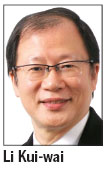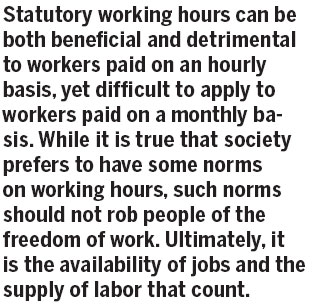Statutory work hours feasible?
Updated: 2013-04-13 05:47
By Li Kui-Wai(HK Edition)
|
|||||||
The Hong Kong government has recently set up a committee to look into the feasibility of implementing statutory working hours, including a possible maximum number of working hours. This can be unnecessarily confusing and complicated if some economic concepts are not cleared.

The government has already implemented a statutory minimum wage of HK$28 per hour since two years ago, which will be raised to HK$30 next month. There are always debates and vested interest in labor issues. Workers always ask for higher pay thinking that employers always generate profit. Businesses always minimize their wage payment as employers have to shoulder the business risk, and profit is not a guarantee. While people may take sides in any employer-labor relationship, the simple truth is that they need each other, and should be seen more as a complimentary than a conflicting relationship. It would be better to nurture a more harmonious relationship.
The labor pressure groups are asking for a statutory regime of working hours. One concern is that there has to be a distinction between workers that are paid hourly and workers that are paid monthly. Low-skilled workers tend to be paid on an hourly basis, and the minimum wage legislation has provided them with enough protection. The issue for the hourly-paid workers is simpler, in that pay is calculated based on the number of hours worked. A law on working hours may put a cap on the maximum number of work hours, and extra or overtime pay will have to be made should employers ask the workers to work in excess of the statutory working hours. This is a double-edged sword. Employers can hire more workers to ensure that no one exceeds the maximum hours. The workers will have some kind of protection but may not be able to earn because of the cap on working hours.
For workers on monthly salary, the law on maximum working hours may not be that straightforward due to a number of factors such as the nature of the profession, corporate culture, psychological strain, seasonality of the business and the supply of professionals. It is true that white-collar workers and professionals in Hong Kong tend to work after "office hours", and many even complain of heavy workloads or pressure from work, while others may not be able to leave "early" as other workers are staying behind after office hours. There is a large work/time disparity among professionals on a monthly salary.

The nature of the profession often dictates working hours. Some work on shifts. Firemen may not have any fire to fight during their shift. Medical doctors may be on-call after the shift, especially when there is a lack of qualified medical personnel. Other professional jobs may require constant updating and upgrading, and many workers attend evening classes to ensure their competitiveness. Some sales persons have to travel to meet clients at odd hours. In short, it is impossible to have one law that suits people from all walks of life.
One can complain about "overwork", while others may consider that an increase in productivity and efficiency. Hong Kong has a unique working culture. Firstly, distance to work is not that long and travel time is controllable. The hiring of housemaids lessens some of the workload of female workers. The culture has also been shaped by economic events. The outbreak of the Asian financial crisis in 1997 led to economic recession in Hong Kong until 2005. As a result, the unemployment rate topped 7 percent at one time. Fearful of losing their jobs many people worked longer in order to help their employers and fellow workers through the bad times.
The problem for professionals and workers with monthly salaries is not so much about overtime, or the need to have maximum statutory working hours. The practice adopted during the time of the Asian financial crisis has to change. It is time to return to the 40-hour week, but employers may have to hire more. The question then is whether employers can afford it, and whether there are suitable workers to hire? For medical professionals, there is just insufficient supply, as the demand rises faster than the supply. Even with higher pay, medical personnel may need to work overtime. In other professions there may be excess supply of workers, and competition is high. But whether employers can hire more depends also on business prospects and other production costs.
Discussion of statutory working hours does serve the purpose of arousing people's interest in their working patterns. One should not think of such a law as an extension of the minimum wage law. Statutory working hours can be both beneficial and detrimental to workers paid on an hourly basis, yet difficult to apply to workers paid on a monthly basis. While it is true that society prefers to have some norms on working hours, such norms should not rob people of the freedom of work. Ultimately, it is the availability of jobs and the supply of labor that count. We should think more in terms of expanding job horizons and employment opportunities for workers rather than restricting opportunities.
The author is associate professor at the Department of Economics and Finance at City University of Hong Kong.
(HK Edition 04/13/2013 page6)